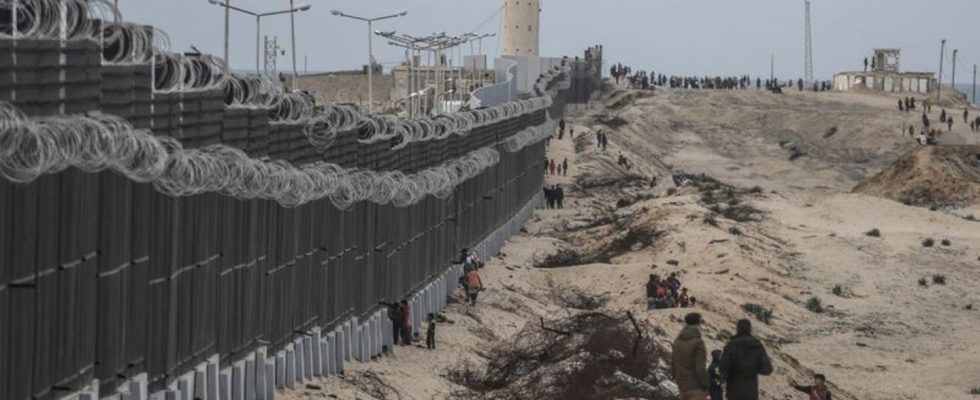If Israel launches an offensive in southern Gaza, the war would come close to Egypt. If refugees or missiles cross the border, the 45-year-old peace treaty will be put to a severe test.
Concrete walls and barbed wire, sections with new walls and steel barriers: the structures around the Rafah border crossing between Egypt and the Gaza Strip are set to become even stronger and even more difficult to overcome. Work has begun to reinforce the border, the Mada Masr news site recently reported. People in Egypt are anxiously awaiting the Israeli army’s announced offensive in the south of Gaza – directly behind the wall, right on their own doorstep, so to speak.
An advance of Israeli troops into Rafah would bring the war closer to Egyptian territory. Concern is growing in Cairo that many of the 1.5 million Palestinian civilians could flee Rafah and stream across the border. If Israeli missiles land on Egyptian soil – even if unintentionally – it would put the 1979 peace treaty between the two countries to a severe test.
Comparatively stable neighborhood
This peace treaty is now 45 years old. It was the first time that an Arab country recognized Israel. In return, Israel withdrew from the Sinai Peninsula, which it occupied in 1967. The agreement followed four bloody Middle East wars. Even though a rather “cold peace” still prevails today, the treaty led the two states to a comparatively stable neighborhood.
Israel’s leadership currently does not want to see an end to the Gaza war without advancing its armed forces to the border town of Rafah. “It is impossible to achieve the war goal of eliminating Hamas if four Hamas battalions remain in Rafah,” Prime Minister Benjamin Netanyahu said on February 9. That day he announced that he was ordering the army to prepare plans for a Rafah offensive. But these would also have to include a concept for the evacuation of the now 1.5 million civilians in the city.
There is loud international criticism of the announced deployment in the overcrowded city. UN Secretary-General António Guterres warned of “devastating” consequences, French President Emmanuel Macron warned of a “catastrophe of new proportions,” and US President Joe Biden called for “a credible plan” to protect civilians. Netanyahu is sticking to the plans and said on Saturday that they would not bow to international pressure. “Anyone who wants to prevent us from operating in Rafah is ultimately telling us ‘lose the war’.”
Reports of a huge reception camp
There are many questions in the room. How should this enormous number of people, including many injured, sick, infirm, children and those exhausted after months of war, be moved? Where should those affected go? And then how will they be provided with humanitarian aid and community services where they are supposed to go?
People are also thinking about this in Cairo. According to security circles, a buffer zone is already being set up on the Egyptian side to accommodate up to 100,000 people in tents and buildings. The London-based Sinai Foundation for Human Rights and the Wall Street Journal also reported on this buffer zone as a huge reception camp for Palestinians, surrounded by a seven-meter-high wall.
However, the head of the State Information Service (SIS), Diaa Raschwan, rejected the reports. According to his account, the buffer zone and fences were built long before the war began. For his part, the governor of North Sinai, Mohammed Shusha, spoke of a “logistical zone” to facilitate aid deliveries to Gaza, including warehouses, truck parking spaces and accommodation for drivers. At the same time, Shusha emphasized that no “forced migration” of Palestinians to Egypt would be allowed.
Cairo is said to have already circulated advance warnings in diplomatic circles. If Israel tries to somehow push Palestinians across the border into Sinai, Egypt would consider this a violation of the joint peace treaty, US media reported, citing diplomats. In such a case, Egypt even threatened to suspend the contract itself. On Sunday it became known that Egypt now wants to accuse Israel of illegal practices in the Palestinian territories before the ICJ, the highest court of the United Nations.
“Long list of common interests”
It became clear in October that war can quickly spread across the border: Israeli shelling hit an Egyptian military post, and several border guards were slightly injured by fragments of tank shells. Israel’s military said it was an oversight and apologized. Egypt later said that Israeli military aircraft had bombed the Rafah crossing “four times.”
The question is also how far Israel can go without messing with Egypt. The security cooperation between the two countries, including on the Gaza border and the so-called Philadelphia Corridor, is generally considered to be trustworthy. Up to 750 Egyptian border guards have been controlling this narrow, 14-kilometer-long strip along Gaza’s border with Egypt since Israel withdrew from the area in 2005. On the Palestinian side, it was Hamas that violently seized power in the coastal area in 2007.
“Both countries share a long list of common interests,” writes the Israeli think tank INSS. These include the “mutual desire to weaken Hamas in Gaza and to demilitarize the Gaza Strip,” as well as averting a situation in which the coastal area becomes a “terror nest” that threatens both countries.
On the Egyptian side, it is hoped that Israel’s army will understand the border as such. Egypt’s Foreign Minister Samih Shukri said during a visit to Ljubljana, according to the Slovenian news agency STA: “Egypt will respect the (peace treaty) concluded more than 40 years ago as long as Israel respects it.”

